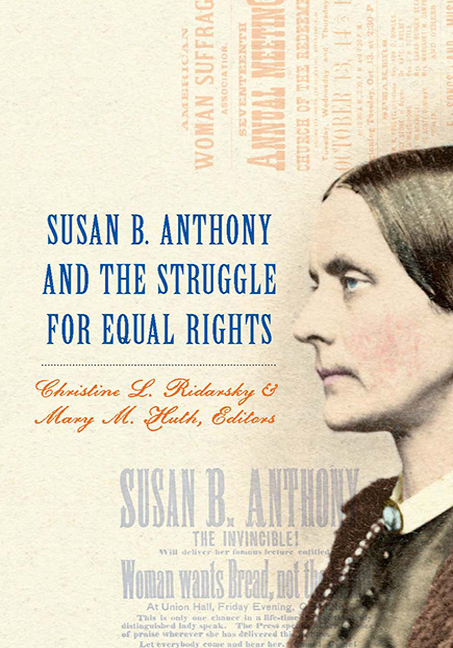Book contents
- Frontmatter
- Dedication
- Contents
- Preface
- Introduction
- Part 1 Constructing Memory
- Part 2 Anthony and Her Allies
- Part 3 Broadening the Boundaries of the Equal Rights Struggle
- Chapter 4 Others and Origins: Nineteenth-Century Suff ragists and the “Indian Problem”
- Chapter 5 Frances Watkins Harper and the Search for Women's Interracial Alliances
- Chapter 6 The Ladies’ Land League and the Labor Question: Irish-American Women and Social Reform in the Late Nineteenth Century
- Part 4 Reconstructing Memory
- List of Contributors
- Index
Chapter 6 - The Ladies’ Land League and the Labor Question: Irish-American Women and Social Reform in the Late Nineteenth Century
from Part 3 - Broadening the Boundaries of the Equal Rights Struggle
Published online by Cambridge University Press: 09 May 2017
- Frontmatter
- Dedication
- Contents
- Preface
- Introduction
- Part 1 Constructing Memory
- Part 2 Anthony and Her Allies
- Part 3 Broadening the Boundaries of the Equal Rights Struggle
- Chapter 4 Others and Origins: Nineteenth-Century Suff ragists and the “Indian Problem”
- Chapter 5 Frances Watkins Harper and the Search for Women's Interracial Alliances
- Chapter 6 The Ladies’ Land League and the Labor Question: Irish-American Women and Social Reform in the Late Nineteenth Century
- Part 4 Reconstructing Memory
- List of Contributors
- Index
Summary
In 1898, Leonora O'Reilly expressed her great sadness at the death of utopian novelist and reformer Edward Bellamy. “Will I ever forget what an impression Looking Backward made on me and all the people with whom I associated in 1889,” she wrote to a friend. Bellamy's most famous novel offered a powerful critique of the effects of industrial capitalism and promised to solve America's widespread labor problems, presenting a futuristic model of a cooperative society in which everyone worked and no job was considered menial. Many social reformers acknowledged their debt to Bellamy's work, but O'Reilly was not a typical reformer. In contrast to the welleducated, middle-class Protestant reformers of the era, O'Reilly left school at an early age to take up the same trade as her Irish-born mother—sewing. Like most Irish-American women who became activists in the nineteenth century, O'Reilly knew the perils of industrial capitalism firsthand. She, and her widowed mother, experienced the poverty, harsh working conditions, and periods of unemployment that came with the boom and bust economy of the Gilded Age. The first Irish-American women to embrace social reform did so as a means of aiding and protecting the most vulnerable in industrial America. Therefore, ethnicity and class are central to explaining their entry into public life.
Three points are paramount to understanding the activism of Irish-American women in the nineteenth century. First, a wave of Irish nationalism, which swept through the United States in the early 1880s, gave them their first experiences in the public sphere. Although some controversy erupted within the Catholic Church, women generally found it socially acceptable to advocate for relief of their downtrodden brothers and sisters across the Atlantic and to endorse Irish independence. Second, within Irish nationalist circles, the more radical element called not only for land reform in Ireland, but for a worker-centered agenda in the United States, one that would restore to producers the fruits of their labor. This movement appealed to Irish-American workers and drew women into reform movements beyond the confines of nationalism. Finally, those women who embraced the need to reform industrial capitalism in America and protect its most exploited also found it necessary to seek alliances with middleclass Protestant reformers. Without enough support from men in the labor movement, women explored other strategies to help “the working girl.” This ultimately brought them beyond Irish or Catholic circles, into the wider American reform tradition.
- Type
- Chapter
- Information
- Susan B. Anthony and the Struggle for Equal Rights , pp. 172 - 198Publisher: Boydell & BrewerPrint publication year: 2012



